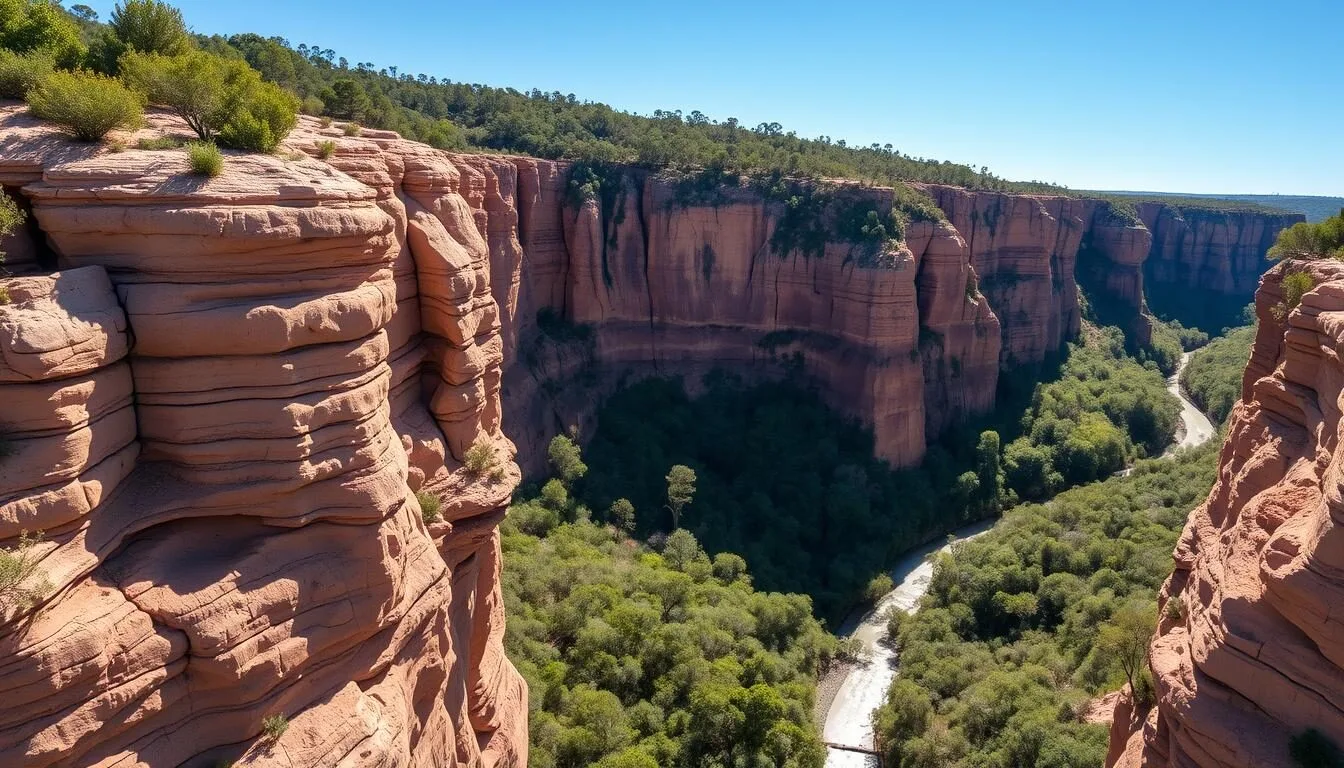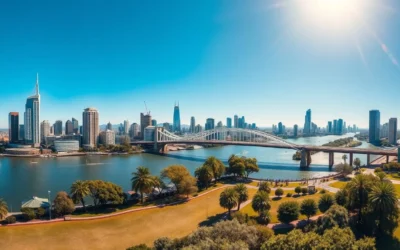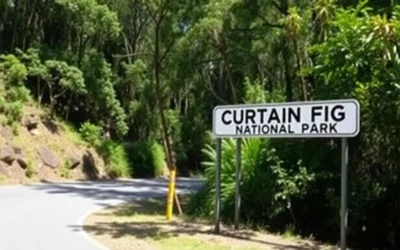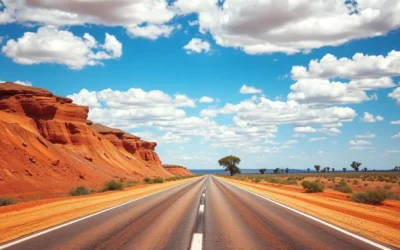Did you know that Carnarvon Gorge houses over 2,000 Indigenous rock art pieces dating back more than 3,000 years, yet most visitors miss half of these remarkable cultural treasures? This spectacular sandstone wilderness in Queensland’s Central Highlands isn’t just another national park—it’s a living museum where ancient stories are etched into dramatic cliff faces that tower 200 meters above pristine creeks and pockets of subtropical rainforest.
Getting There & Planning Your Journey
Carnarvon Gorge is nestled in Queensland’s central highlands, approximately 720km northwest of Brisbane. Due to its remote location, careful planning is essential before embarking on your journey.
By Air
The closest airports to Carnarvon Gorge are:
- Emerald Airport (3.5 hours drive)
- Roma Airport (3.5 hours drive)
- Rockhampton Airport (5 hours drive)
- Gladstone Airport (5.5 hours drive)
Find the Best Flights to Queensland
Compare prices and book your flights to the nearest gateway for your Carnarvon Gorge adventure.
By Road
No matter which direction you’re coming from, you’ll need a reliable vehicle to reach Carnarvon Gorge. The roads leading to the park are now sealed, but you’ll be driving through remote areas where services are limited.
- From Brisbane: 8-9 hour drive (720km)
- From Rockhampton: 4.5 hour drive
- From Roma: 2.5-3 hour drive
Rent a Reliable Vehicle
An SUV or 4WD is recommended for the journey to Carnarvon Gorge. Book early to secure the best rates.
Essential Travel Tips
- Fill up your fuel tank at the last major town (Rolleston to the north or Injune to the south)
- Stock up on groceries and supplies before arriving
- Avoid driving at dusk or dawn when wildlife is most active
- Carry extra water, snacks, and a first-aid kit
- Download maps and information as mobile coverage is limited
Best Time to Visit & Weather Tips

The climate at Carnarvon Gorge varies dramatically throughout the year, making timing your visit crucial for comfort and safety.
Seasonal Considerations
| Season | Months | Temperature | Conditions | Recommendation |
| Winter | June-August | 5-22°C (41-72°F) | Clear skies, cool nights, occasional frost | Ideal time to visit |
| Spring | September-November | 15-30°C (59-86°F) | Warming days, wildflowers blooming | Excellent for hiking |
| Summer | December-February | 20-40°C+ (68-104°F+) | Very hot days, afternoon storms | Avoid if possible |
| Autumn | March-May | 15-28°C (59-82°F) | Cooling temperatures, less crowded | Good option |
The best time to visit Carnarvon Gorge is between April and September when temperatures are mild and comfortable for hiking. During winter months (June-August), days are pleasantly warm at around 22°C (72°F), but nights can be chilly, occasionally dropping below freezing.
Summer Warning
Summer temperatures regularly exceed 35°C (95°F) and can reach dangerous levels above 40°C (104°F). If visiting during summer (December-February), start hikes before dawn, carry plenty of water, and plan to be off the trails by 10 am.
School holidays (particularly Easter and June/July) bring larger crowds, so book accommodation well in advance if visiting during these periods.
Getting Around Locally
Once you’ve arrived at Carnarvon Gorge, getting around is primarily done on foot. The park is designed for walking, with the main gorge track serving as the central artery from which side tracks branch off to various attractions.
Park Layout
The main visitor area serves as the starting point for most walks. From here, the Main Gorge Track extends approximately 10km into the gorge, with various side tracks leading to specific attractions. Most visitors spend 1-3 days exploring these trails.
Walking Distances
| Attraction | Distance (return) | Walking Time | Difficulty |
| Rock Pool | 400m | 20 minutes | Easy |
| Mickey Creek Gorge | 3km | 1.5 hours | Easy |
| Boolimba Bluff | 6.4km | 3 hours | Moderate-Hard |
| Moss Garden | 7km | 2.5 hours | Moderate |
| Amphitheatre | 10km | 3 hours | Moderate |
| Art Gallery | 14km | 5 hours | Moderate |
| Cathedral Cave | 22km | 8 hours | Hard |
| Big Bend | 30km | 9-11 hours | Hard |
Walking Strategy
For multi-day visitors, consider tackling the shorter walks on your first day, then attempting the longer Main Gorge Track on your second day. Start early (before 8 am) if attempting the full track to Big Bend.
Where to Stay

Accommodation options at Carnarvon Gorge are limited but varied, catering to different preferences and budgets. Booking well in advance is essential, especially during peak periods (April-September).
Carnarvon Gorge Wilderness Lodge
Offering 28 safari-style cabins set in natural bushland, this is the most comfortable option available. Facilities include private ensuite bathrooms, air conditioning, and a restaurant (seasonal operation).
Price range: $$$-$$$$
Best for: Couples and those seeking comfort
Takarakka Bush Resort
A popular option with various accommodation types including safari tents, cabins, and powered/unpowered camping sites. Communal kitchens, bathrooms, and a small shop are available.
Price range: $$-$$$
Best for: Families and groups
Sandstone Park
Catering specifically to caravans and RVs, this property offers spacious sites with beautiful views. Basic facilities include toilets and a dump point.
Price range: $-$$
Best for: Self-sufficient travelers with caravans
Camping Options
For those who prefer camping, there are several options:
- Carnarvon Gorge Camping Area: Located within the national park near the visitor center. Only open during Queensland school holidays (Easter, June/July, September). Basic facilities include toilets and picnic tables.
- Big Bend Camping Area: Remote campsite 10km along the Main Gorge Track. Must carry all camping equipment in. Very basic facilities.
- Takarakka Bush Resort Camping: Powered and unpowered sites with access to shared facilities.
Book Your Carnarvon Gorge Accommodation
Secure your stay at one of the limited accommodation options near this popular destination.
Dining & Local Cuisine
Dining options at Carnarvon Gorge are extremely limited, and self-catering is the norm for most visitors. There are no restaurants or cafes within the national park itself.
Food Options
- Wilderness Lodge Restaurant: Open seasonally (typically April-October), serving breakfast and dinner. Bookings essential.
- Takarakka Bush Resort: Small shop selling basic supplies and some fresh foods. During peak season, they occasionally offer communal dinners.
Self-Catering Tips
- Stock up on groceries at the last major town before arriving (Roma, Emerald, or Rockhampton)
- Bring a cooler with ice for perishable items
- Pack easy-to-prepare meals for your stay
- Bring sufficient water or water purification methods
- Don’t forget cooking equipment if camping
Most accommodation options provide BBQ facilities and communal kitchens where you can prepare your own meals. For day hikes, pack substantial snacks and lunch to keep your energy levels up on the trails.
Attractions, Sightseeing & Activities
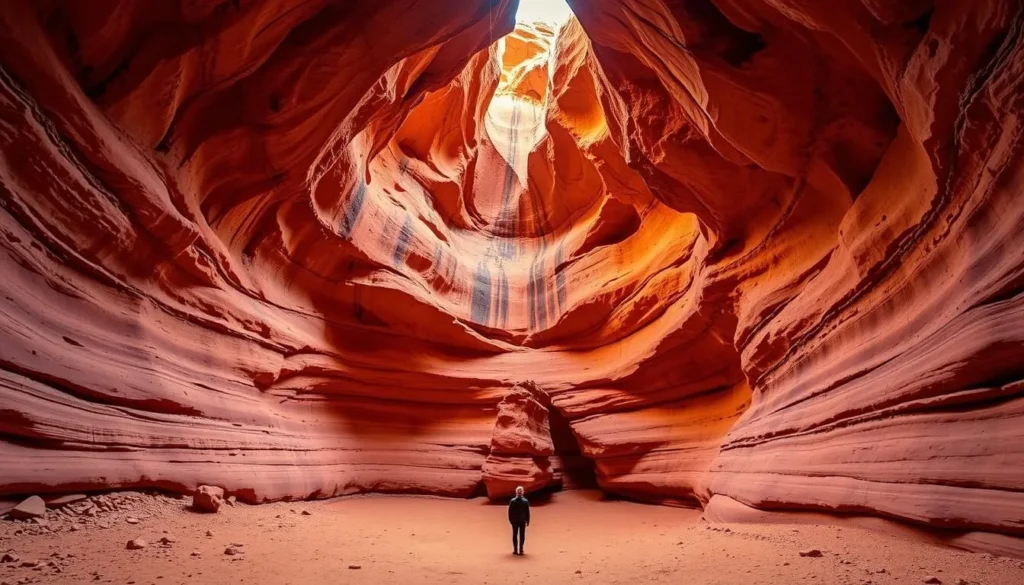
Carnarvon Gorge offers a wealth of natural and cultural attractions that will keep you busy for several days. Here are the must-see highlights:
Top Natural Attractions
The Amphitheatre
Perhaps the most spectacular formation in the gorge, this hidden chamber within the cliff face is accessed through a narrow crevice. The cavernous space features 60m high walls and excellent acoustics.
Distance: 10km return
Don’t miss: The echo effect when inside
Moss Garden
A magical oasis where water seeps through the porous sandstone, creating a permanently wet environment where delicate mosses, ferns and liverworts thrive. A small waterfall completes this enchanting spot.
Distance: 7km return
Don’t miss: The emerald colors in morning light
Ward’s Canyon
A cool, sheltered slot canyon that houses the world’s largest fern – the rare King fern (Angiopteris evecta). These prehistoric plants have fronds up to 5m long and are remnants from when Australia was part of Gondwana.
Distance: 11.7km return
Don’t miss: The ancient king ferns
Boolimba Bluff
The only track that takes you to the top of the gorge, offering spectacular panoramic views across the gorge and surrounding landscape. The climb includes steel ladders and is relatively steep.
Distance: 6.4km return
Don’t miss: Sunrise or sunset views
Rock Pool
A natural swimming hole located near the park entrance, perfect for cooling off after a day of hiking. This is one of only two designated swimming spots in the area.
Distance: 400m return
Don’t miss: Early morning platypus sightings
Boowinda Gorge
A narrow, winding slot canyon with smooth, water-carved walls that twist and turn. Located near the end of the Main Gorge Track, it’s worth the long hike to experience this magical place.
Distance: 22km return (plus side track)
Don’t miss: The play of light on the curved walls
Explore Carnarvon Gorge with Expert Guides
Enhance your experience with knowledgeable local guides who can reveal the secrets of this ancient landscape.
Indigenous Cultural Heritage
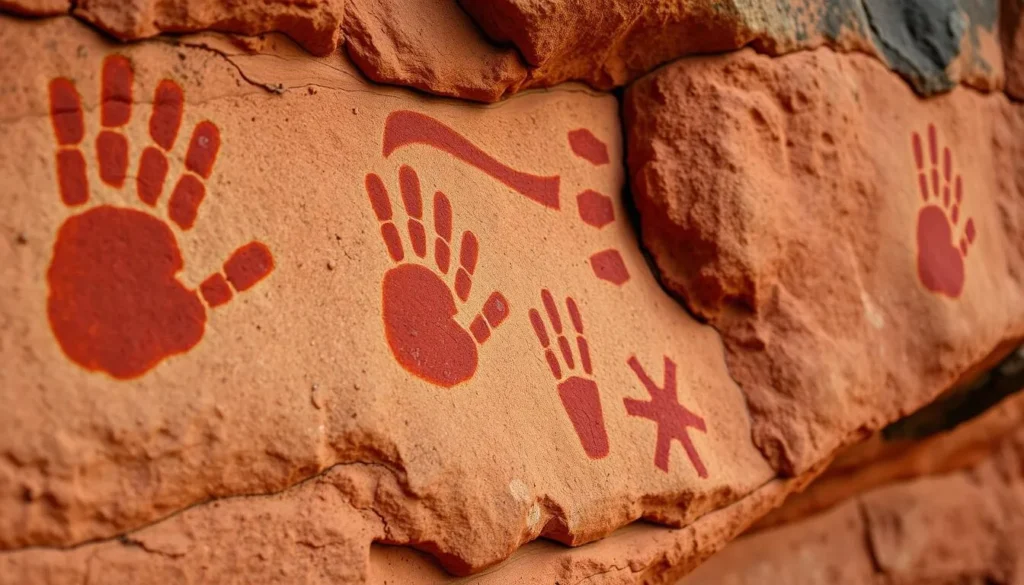
Carnarvon Gorge holds immense cultural significance for Indigenous Australians, particularly the Bidjara and Karingbal peoples. The gorge contains some of Australia’s most important and extensive rock art sites, offering visitors a glimpse into Aboriginal culture spanning thousands of years.
Significant Cultural Sites
The Art Gallery
This 62-meter long sandstone wall contains over 2,000 engravings, ochre stencils, and freehand paintings. You’ll see stencils of hands, boomerangs, stone axes, and other cultural items. The site is thought to have been used for important women’s business and ceremonies.
Distance: 14km return
Cathedral Cave
A massive overhang that served as an important Aboriginal shelter and ceremonial site. The extensive gallery of rock art here spans thousands of years, with some art dating back millennia and other pieces created just 200 years ago, including examples of “contact art” from when Europeans first arrived.
Distance: 22km return
When visiting these sacred sites, please show respect by not touching the artwork, maintaining silence, and following all park guidelines. Photography without flash is permitted, but consider the cultural sensitivity of what you’re capturing.
Wildlife & Natural Environment
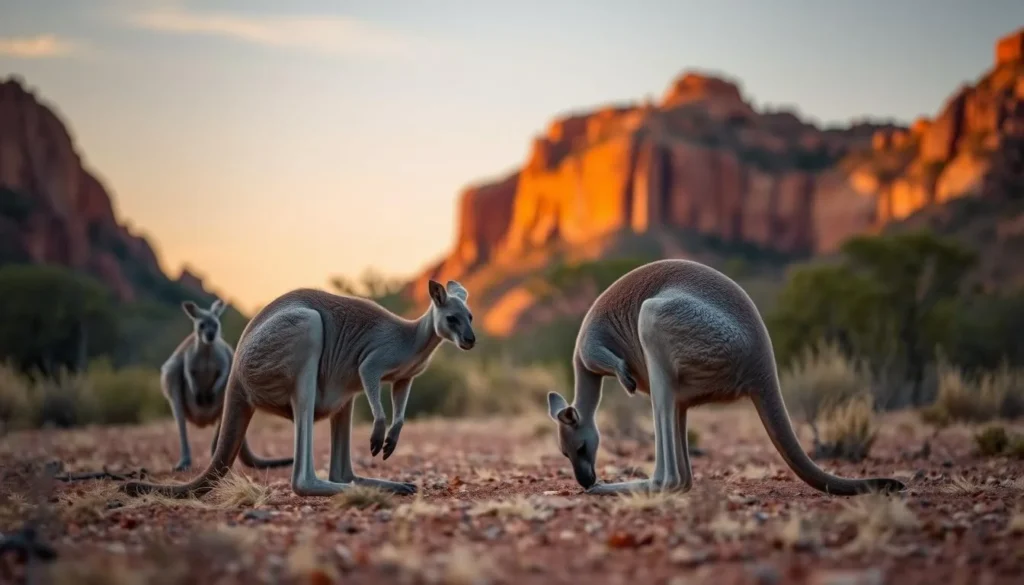
Carnarvon Gorge is a biodiversity hotspot where several ecosystems converge, creating habitats for a wide range of plants and animals. The permanent water source in an otherwise arid landscape makes it an oasis for wildlife.
Animals to Spot
- Eastern Grey Kangaroos: Commonly seen grazing around accommodation areas, especially at dawn and dusk
- Platypus: These elusive monotremes can sometimes be spotted in Carnarvon Creek, particularly at the Rock Pool in early morning or late afternoon
- Echidnas: Often seen foraging along trail edges
- Brush-tailed Rock-wallabies: Look for these agile wallabies on rocky outcrops
- Over 170 bird species: Including kookaburras, currawongs, bowerbirds, and various parrots
- Reptiles: Goannas, bearded dragons, and various skinks are common
Plant Life
The gorge features a fascinating mix of plant communities:
- Ancient cycads: Prehistoric plants that have existed for over 200 million years
- King ferns: The world’s largest fern species, found only in Ward’s Canyon within the park
- Cabbage palms: Remnants from when Australia was part of Gondwana
- Spotted gums: Tall eucalypts with distinctive mottled trunks
- Bottle trees: Iconic Australian trees with water-storing trunks
Wildlife Viewing Tips
- Dawn and dusk are the best times for wildlife spotting
- Move quietly and keep your distance from animals
- Bring binoculars for bird watching
- Look for platypus at the Rock Pool in early morning
- Never feed wild animals
Hiking & Walking Trails

Hiking is the primary activity at Carnarvon Gorge, with trails ranging from easy short walks to challenging full-day adventures. The park’s unique layout means most walks follow the Main Gorge Track, with side trips branching off to specific attractions.
Main Walking Tracks
| Track | Distance | Time | Difficulty | Highlights |
| Nature Trail | 1.5km loop | 30 min | Easy | Introduction to gorge ecology, possible platypus sightings |
| Mickey Creek Gorge | 3km return | 1.5 hours | Easy | Narrow slot canyon, moss-covered walls |
| Rock Pool | 400m return | 20 min | Easy | Swimming hole, wildlife viewing |
| Boolimba Bluff | 6.4km return | 3 hours | Moderate-Hard | Panoramic views, steel ladder climb |
| Moss Garden | 7km return | 2.5 hours | Moderate | Ferns, moss, small waterfall |
| Amphitheatre | 10km return | 3 hours | Moderate | Hidden chamber in cliff face |
| Ward’s Canyon | 11.7km return | 4 hours | Moderate | Ancient king ferns, cool microclimate |
| Art Gallery | 14km return | 5 hours | Moderate | Aboriginal rock art, 2,000+ engravings and paintings |
| Cathedral Cave | 22km return | 8 hours | Hard | Extensive Aboriginal art site, large overhang |
| Big Bend | 30km return | 9-11 hours | Hard | Remote campsite, impressive cliff faces |
Multi-Day Option: Carnarvon Great Walk
For experienced hikers, the 87km Carnarvon Great Walk offers a challenging 6-7 day circuit through the gorge and surrounding tablelands. This walk requires advance booking, proper equipment, and thorough preparation. The track is closed from November to February due to extreme heat.
Hiking Safety
- Carry at least 2-3 liters of water per person for day hikes
- Wear appropriate footwear and sun protection
- Start early in the morning, especially in warmer months
- Inform someone of your planned route and expected return time
- Be prepared for creek crossings on stepping stones
- Carry a basic first aid kit
Practical Travel Tips
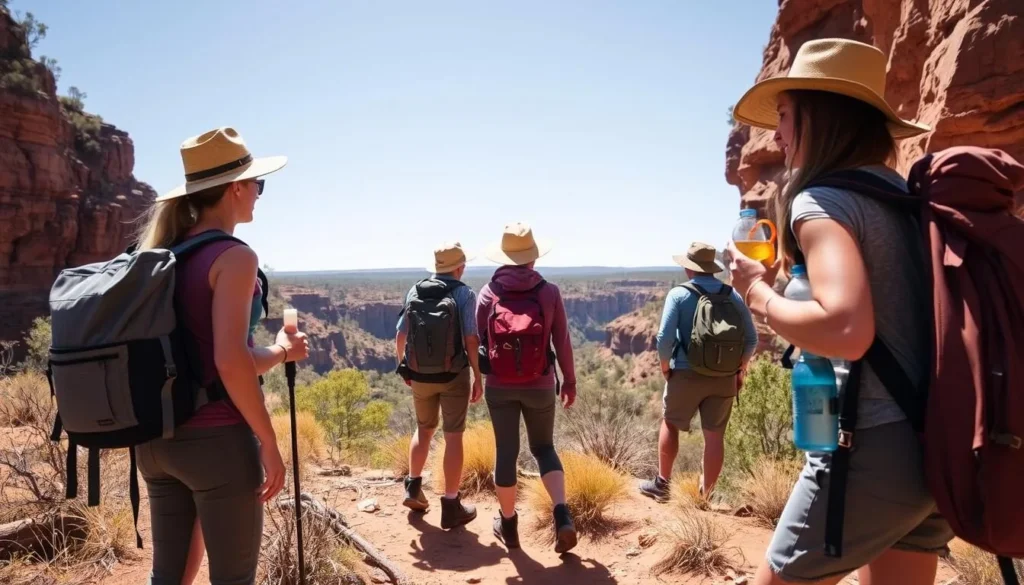
What to Pack
- Hiking gear: Comfortable walking shoes/boots, backpack, hat, sunglasses
- Sun protection: High-SPF sunscreen, long-sleeved shirts, wide-brimmed hat
- Water containers: Multiple bottles or a hydration bladder (minimum 2-3 liters capacity)
- Food: Snacks and meals for your entire stay
- First aid kit: Including bandages, antiseptic, pain relievers, and any personal medications
- Navigation: Park maps, compass, or downloaded offline maps
- Clothing: Layers for variable temperatures, especially in winter when nights are cold
- Swimming gear: For the Rock Pool
- Insect repellent: Particularly important for Mickey Creek Gorge
- Camera: For capturing the spectacular scenery
Park Facilities
Facilities at Carnarvon Gorge are basic:
- Visitor Information Centre (open 8am-4pm)
- Toilets at the visitor area and some accommodation sites
- Picnic tables and limited shelters
- No rubbish bins (pack out all waste)
- Limited mobile phone coverage (generally none within the gorge)
- No WiFi
Park Etiquette
- Stay on marked trails to protect the environment
- Take all rubbish with you
- Do not disturb or feed wildlife
- Respect Indigenous cultural sites – no touching of rock art
- No drones without permits
- Pets are not permitted in the national park
- Swimming is only allowed at the Rock Pool
Suggested Itineraries
One Day at Carnarvon Gorge
If you only have one day, focus on these highlights:
- Start early (by 7am) and head straight to the Moss Garden (7km return)
- Continue to the Amphitheatre (10km return)
- If time and energy permit, extend to Ward’s Canyon
- Return via the Main Gorge Track
- Cool off with a swim at the Rock Pool
Two Days at Carnarvon Gorge
With two days, you can see most of the main attractions:
Day 1:
- Morning: Mickey Creek Gorge and Rock Pool
- Afternoon: Boolimba Bluff for sunset views
Day 2:
- Full day on the Main Gorge Track, visiting Moss Garden, Amphitheatre, Ward’s Canyon, and Art Gallery
- Return for a refreshing swim at the Rock Pool
Three Days or More
With three or more days, you can explore at a more leisurely pace and reach the more distant sites:
Day 1: Same as two-day itinerary
Day 2: Main Gorge Track to Art Gallery, including side trips
Day 3: Full day hike to Cathedral Cave and Big Bend
Ready to Experience Carnarvon Gorge?
Book your accommodation, transportation, and tours now to secure your perfect Queensland adventure.
Conclusion
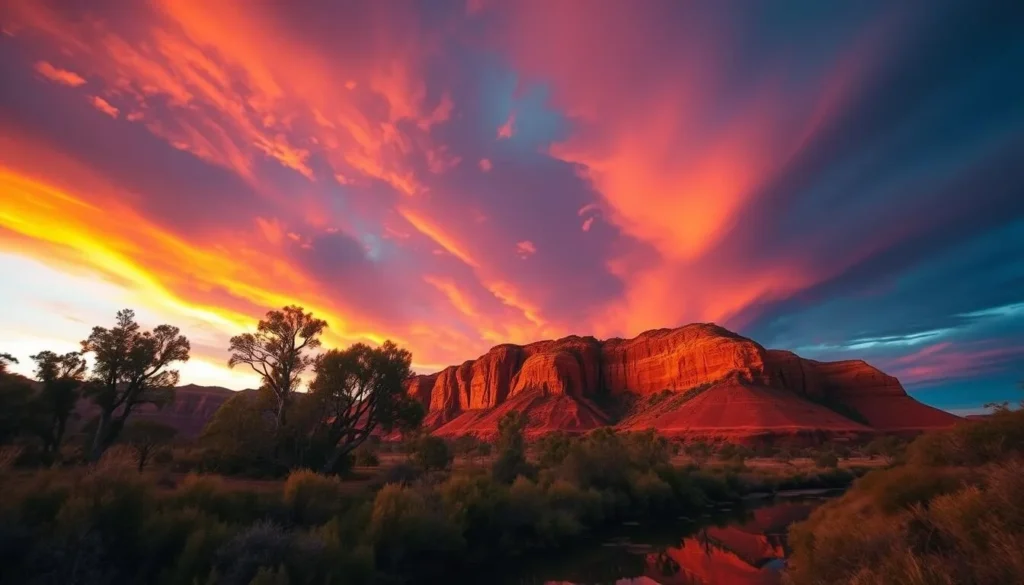
Carnarvon Gorge stands as one of Queensland’s most remarkable natural treasures—a place where ancient Indigenous culture, spectacular geology, and diverse ecosystems converge. From the awe-inspiring Amphitheatre to the sacred Aboriginal art sites, every step through this sandstone wilderness reveals another layer of Australia’s natural and cultural heritage.
Whether you’re an avid hiker seeking challenging trails, a nature lover hoping to spot platypus and rock-wallabies, or someone interested in connecting with Australia’s Indigenous history, Carnarvon Gorge offers experiences that will remain with you long after you’ve left its towering sandstone walls.
The journey to this remote paradise requires planning and preparation, but those who make the effort are rewarded with memories of one of Australia’s most spectacular landscapes—one that relatively few visitors get to experience. As you walk along the creek, crossing stepping stones beneath soaring cliffs, you’ll understand why Carnarvon Gorge has been a place of significance for tens of thousands of years.
The above is subject to change.
Check back often to TRAVEL.COM for the latest travel tips and deals.
